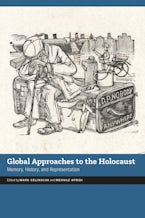The field of contemporary Holocaust studies is increasingly international in perspective. These approaches do not detach themselves from European history; rather, they incorporate perspectives and voices not always considered in more traditional Holocaust studies.
The contributors to this volume take such an approach as they examine the Holocaust, adding to the historical and memorial reach of the subject through an international range of voices. Global Approaches to the Holocaust asks: What happens when scholars shift their focus from an exclusively European perspective of the Holocaust? What new insights are gained from exploring the impact of the Holocaust from outside the European milieu? How do countries that were not directly affected by Nazi policies of occupation and extermination remember the Holocaust? What consequences does an expansive approach to the Holocaust entail?
With essays about North and South Africa, Mauritius, Japan, Argentina, Mexico, Chile, the Philippines, the United States, Australia, Canada, India, Pakistan, Palestine, Columbia, New Zealand, and more, Global Approaches to the Holocaust seeks to create a critical voice in Holocaust studies that encompasses not only Europe but also Asia, Africa, South and North America, Australia, and the Middle East.
Acknowledgments
Introduction: Series of Concentric Circles
Mark Celinscak and Mehnaz Afridi
Part 1. Memory
1. Holocaust Memory in South Africa
Shirli Gilbert
2. Remembering the Holocaust in Mauritius: Legacies of Slavery, Colonial Violence, and Jewish Displacement
Roni Mikel-Arieli
3. Japan and the Holocaust: Domesticating Others’ Horror
Rotem Kowner and Ran Zwigenberg
4. Holocaust Memory: Temporalities, Actors, and Practices in Two National Cases, Argentina and Mexico
Emmanuel Kahan and Yael Siman
5. Resonances of the Holocaust in the Memory of Nazi Victims and Survivors Living in Chile
Nancy Nicholls LopeandÍa
Part 2. History
6. From Ominous to Miracle Poems: North African Musical Prophecies and Histories of the Holocaust
Aomar Boum
7. Open Doors and Open Hearts: President Manuel Quezon’s Holocaust Sanctuary in the Philippines
Bonnie M. Harris
8. Fort Ontario and American Debates over Refugee Admission
Rebecca L. Erbelding
9. Limiting the Undesirables: Jewish Refugee Migration to Australia in 1938 and 1939
Paul R. Bartrop
10. Reviewing the Past, Re-Viewing the Nation: Early Canadian Responses to Abella and Troper’s None Is Too Many
Richard Menkis
11. Mexico and the Holocaust: The Contradictions of Postrevolutionary Immigration Policy
Daniela Gleizer
Part 3. Representation
12. Holocaust Education in South Asia: The Much-Needed Response to Holocaust Denial, Trivialization, and Inversion
Navras J. Aafreedi
13. Approaches to Holocaust Education in the Arab World: Obstacles and Solutions
Mohammed S. Dajani Daoudi and Zeina M. Barakat
14. “When This Happens, Whoever Can Write”: The Testimonial Representation of the Holocaust in Colombia
Lorena Cardona GonzÁlez
15. Holocaust Education in Australia: History, Importance, and Challenges
Suzanne D. Rutland
16. Aotearoa New Zealand
Ann Beaglehole
17. Representing the Holocaust in a Museum Setting in Post-Apartheid South Africa and Africa
Tali Nates
Conclusion
Mark Celinscak and Mehnaz Afridi
Epilogue
Mark Celinscak, Mehnaz Afridi, and Ilan Stavans
Contributors
Index

